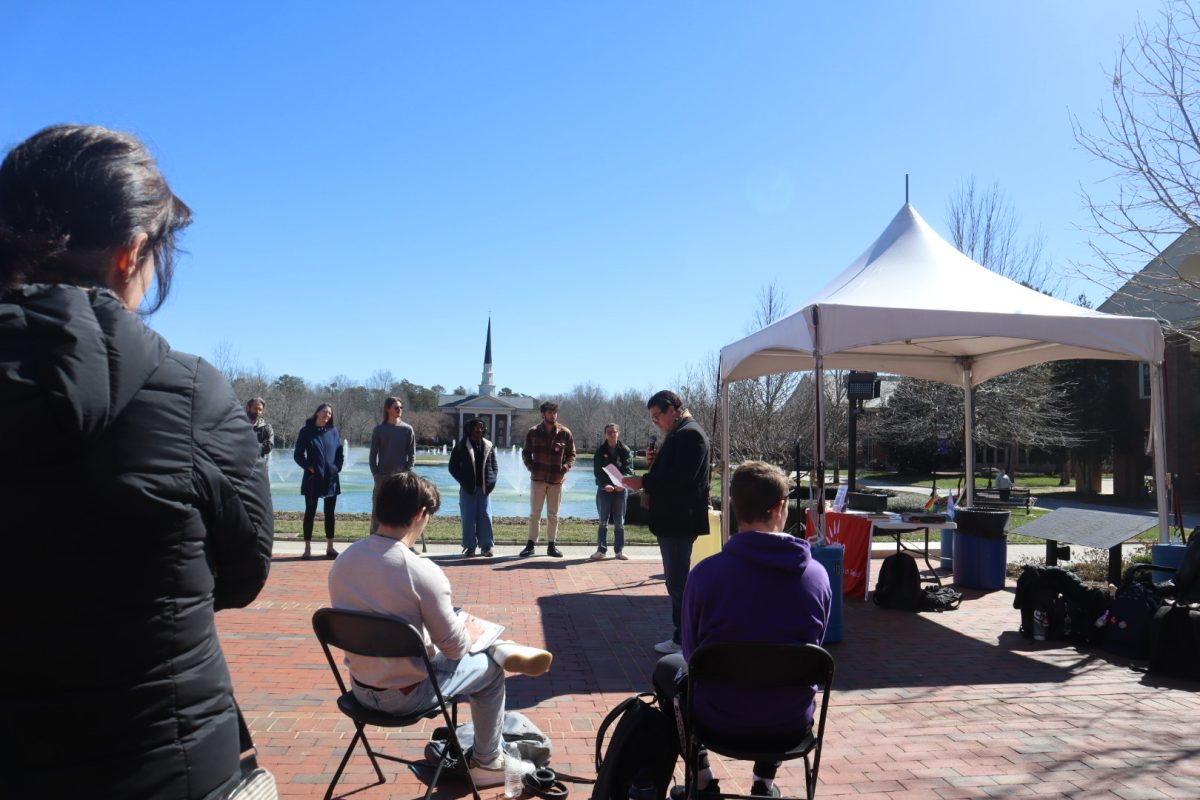The 2024-2025 academic year had been full of irregularities for the Furman community. Natural disasters, financial challenges, and federal policy changes have all forced the university to adapt.
To gauge student sentiments about how the Furman administration has handled challenges this academic year, The Paladin conducted the 2025 Administration Approval Survey from April 10 to April 18. The survey garnered a non-random sample of 116 students after being advertised on social media, through posters on campus and by SGA in an email to the entire student body.


The survey sample is approximately representative across gender and class year demographics. The sample gender ratio was 54% female to 41% male, compared to 57% female to 43% male for the entire student body. There was an approximately equal number of respondents across class years, with fewer freshmen respondents than other classes.
Students lack consensus on President Davis, but sentiments are more negative than positive

Respondents did not express a unified opinion on President Elizabeth Davis. However, one thing is clear: Davis is not popular on campus. When asked about how Davis is conducting her job as the president of Furman University, only 16% of respondents expressed approval, while 43% disapproved and 41% were neutral.
Respondents were given the opportunity to explain their stance on Davis, and several themes emerged.
Across all groups, respondents expressed concerns about administrative transparency and Davis’ relationship with the student body. Many feel that she is not visible enough on campus or at community events and that her communication with the Furman community is opaque and impersonal.
Respondents who approved of Davis focused more on how Furman has grown during her tenure as president. They cited the Furman Advantage and Furman’s success in college rankings as evidence of Davis’ strong performance, and they expressed feeling that Davis has managed the university well amidst challenging circumstances. Others reported thinking that criticisms levied against Davis address issues outside of her control.
Several trends emerge when Davis’ approval is examined across demographic factors.

While respondents of all years were more likely to disapprove than approve of Davis, there is a clear division between lowerclassmen and upperclassmen. The percentage of seniors (37%) and juniors (33%) who disapproved of Davis was between 13-20 points lower than the percentage of sophomores (50%) and freshmen (52%) who disapproved of her. Similarly, the percent of seniors (47%) and juniors (52%) who were neutral on Davis was between 15-22 points higher than sophomores (32%) and freshmen (30%). Approval ratings were similar across classes.

Assessments of Davis were relatively consistent across genders, although male respondents displayed slightly higher approval of Davis than female respondents. There were not enough non-binary respondents to produce significant results.

Assessments of Davis also differed greatly along political lines. Democrat respondents were the least approving of Davis and the most neutral. Republican respondents approved (24%) and disapproved (24%) of Davis at an equal rate. The majority of independents and respondents of other political identities disapproved of Davis, making the group the most critical of her. However, members of the group were still more likely to approve of Davis than Democrats.
Due to a mistake in the survey design, respondents who picked “Other” were not able to specify their political identity, making it difficult to draw a clear ideological distinction between Independents and “Other” respondents. The groups were combined for this reason. However, differing ideological groups likely exist within this category, such as Independents who “lean” towards a traditional party and members of Democratic Socialists of America.
Students overwhelming disapprove of Davis’ management of Furman’s finances, mixed on other issues

Respondents were asked to assess Davis’ management of several prominent issues during the 2024-2025 academic year. Davis’ handling of Furman’s finances stuck out as a controversial topic, with nearly 70% of respondents expressing disapproval.
Regarding her financial management, respondents described Davis as out of touch and overpaid, citing her lack of response to the YDSA Wage Justice Campaign and the $360,000 raise she received between the 2022-23 and 2023-24 academic years. Additionally, some respondents criticized the financial prudence of campus construction projects, such as the Timmons Arena renovations and the recent sidewalk addition near the James B. Duke Library.
Respondents also assessed Davis’ performance on four other issues: environmental hazards, changes to federal funding for higher education, federal changes to DEI policies, and representing Furman University.
A 48% plurality of respondents disapproved of how Davis responded to environmental hazards at Furman this academic year, like Hurricane Helene and the Table Rock wildfire, while 34% approved of her responses. Dissatisfied respondents criticized Davis’ communication about hazards as too late, vague, and unsympathetic, and some asserted that the university did not provide students with enough resources. Satisfied respondents acknowledged that environmental hazards are out of Davis’ control and sympathized with the difficulty of coordinating a response.
A plurality of students answered as being neutral on Davis’ response to federal policy changes on DEI policies and funding for higher education, citing the lack of control Davis has over federal changes. While some students commended her for not preemptively making changes in anticipation of government criticism, limited communication and support from Davis was again a common point of criticism.
Respondents were split on how they assessed Davis’ performance as a representative of the university. Despite the distribution of the approval responses, respondent explanations were similar across all response groups — Davis is skilled in external relations on behalf of the university, but she is out of touch with students.
Students are more likely to approve of the administration than Davis

Respondents were more split in their assessment of the Furman administration than that of Davis. While a similar percentage of respondents expressed being neutral on the administration, the administration’s approval rating was 10 points higher than Davis’. The difference between the disapproval rate and approval rate for the administration was 5 points, compared to 27 points for Davis.
Students generally approve of the administration’s management, except for Academic Affairs and Athletics

Similar to their assessment of Davis’s performance, respondents were asked to assess the administration’s management of various campus sectors during the 2024-2025 academic year. Respondents generally approved of the administration’s performance, with supportive answers far outweighing negative ones in all but two areas.
A large, 46% plurality of students expressed disapproving of how the administration managed academic affairs this year. Among the small number of respondents who addressed this issue in the explanation of their responses, Pathways was commonly criticised as negatively affecting academic life.
Disapproval of how athletics was managed this year was 20 points higher than approval, although more students responded as being neutral on the topic than disapproving. Similar to academic affairs, few respondents chose to elaborate on their disapproval of athletics, but those that did criticised the university for dedicating too much funding towards athletics amidst financial troubles.
Thank you to all students who shared their thoughts in this year’s survey. If you would like to respond to our findings, please do so via a Letter to the Editor.
Data collection and graphs by Clay Wallace, with research assistance from Dr. David Fleming.































































